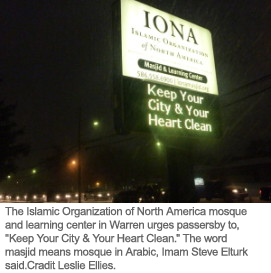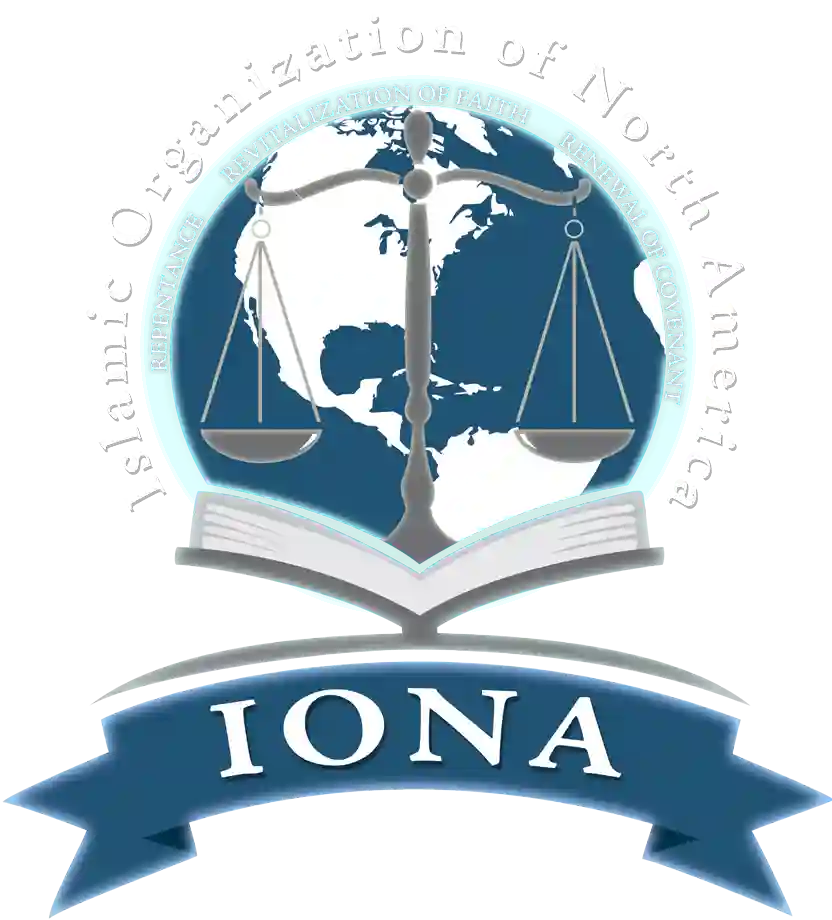IONA in the News
Democratic Club Invites Imam To Speak On Islam (January 13, 2011)

Do you know anyone who is Muslim?
That is the question Oak Park-Huntington Woods Democratic Club chair Marian McClellan has urged Imam Steve Elturk to ask the audience Thursday evening during his talk on Islam.
"There is no opportunity for dialogue," when people don't know each other, McClellan said.
The free event, which will be held at the Oak Park Public Library and is open to the public, aims to open up just such a dialogue. x
McClellan said she organized the talk to help people deal with their fears in the wake of 9/11 and the recent financial meltdown in the United States.
“Everyone’s of two minds,” McClellan said. “There’s Jewish members, whose group has been persecuted. And there are black members, who, obviously their group has been persecuted. We don’t want to see that happen to Muslims.”
But, she said, people do have legitimate concerns about terrorism and she hopes Elturk can help them distinguish between radical Islam and peaceful Muslims.
“The normal Muslims are just as concerned as we are,” about terrorism, she said.
Elturk is an imam – prayer leader – at the Islamic Organization of North America mosque and learning center in Warren, which he said serves about 1,000 people. IONA worshippers hail from places including the United States, Bangladesh, Pakistan, Iraq, Egypt and Syria, Elturk said.
The mosque, located in an unassuming strip mall building, is open every day so the faithful have a place to perform their five daily prayers, he said. The public is welcome – there are separate entrances for men and women – and the learning center holds classes for Muslims and non-Muslims, Elturk said.
The community has come to accept the mosque, which did not at first receive a warm reception, the imam said.
During a public hearing about the center, Warren residents called members of the IONA group names and accused them of being terrorists, Elturk said.
“The feeling on that day – I will be frank with you – it was like having a mountain placed on your heart. I was heartbroken,” he said. “It’s beyond description the feeling one gets in one’s heart.”
But, he said, the neighborhood has come around. One woman even came to a mosque open house and apologized for what happened at the hearing, said Elturk, who is now part of an interfaith group in Warren that includes the Catholic Church, the Lutheran Church and the Interfaith Center for Racial Justice.
“We have a good relationship with our neighbors and our city and our churches and we’re grateful for that,” he said.
For those who have little knowledge of the faith, he laid out some of the core tenets:
Islam is a monotheistic faith.
“Our gratitude to God is shown through rituals,” including five daily prayers, as well as fasting and abstaining from drinking and marital relations from sunrise until sunset each day during the holy month of Ramadan.
It is obligatory to be charitable, giving a percentage of your accumulated wealth to the poor – “kind of like the taxes you file.”
Once in their lifetime, each Muslim is expected to make a pilgrimage to the holy city of Mecca, Saudi Arabia.
Muslims believe in angels and all of God’s books, including the Torah, the New Testament, the Psalms of David and the Quran. They also believe in all of God’s prophets, including Adam, Noah, Abraham, Moses, Jesus, Ishmael and Muhammad, whom they believe was the final prophet.
Muslims believe there will be a Judgment Day, when God will judge one’s deeds and faith.
The concepts of paradise and hell are also part of Islam.
Elturk added that Muslims are required to spread the word of their faith, a struggle known as jihad (the Arabic word jihad means struggle, he said). Violent extremists have perverted the word’s true meaning, he said.
“Just like the evangelists who struggle to preach the faith, we are obligated to share the message of the Quran,” Elturk said. “This holy war thing – there’s no such thing in Islam.”
Once a nonbeliever has learned about Islam, it is up to him or her to decide what they think, he said: “We believe people’s personal faith is personal between them and God.”
Regardless of differences in belief, he said, there are many common threads among all people.
“There’s a lot of social justice issues that people of all faiths – and even those who don’t have faith – can come together to work on,” he said, citing among them the elimination of hatred and prejudice, as well as health care, education and environmental issues. “All of these issues concern all of us.”
When asked what he’d like to say to the public, Elturk responded: “We can continue to live together if we are open and honest with each other.”
